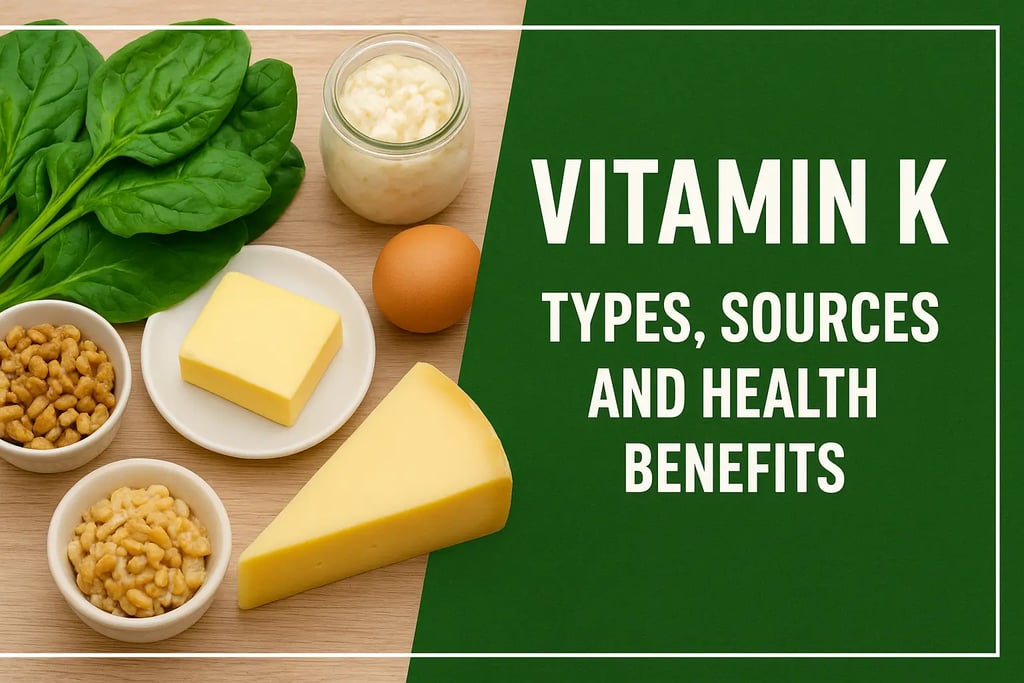Vitamin K: Types, Sources, Benefits, and Deficiency Explained
Learn everything about Vitamin K — its types (K1 and K2), food sources, benefits for blood clotting, bone, and heart health, plus deficiency symptoms and supplements.


🥦 Understanding Vitamin K: Types, Sources, and Health Benefits
Introduction
Vitamin K is an essential fat-soluble vitamin that supports several vital functions in the human body — from blood clotting and bone metabolism to cardiovascular health. This nutrient is often overlooked but is indispensable for maintaining overall wellness.
There are two main types of Vitamin K — Vitamin K1 (phylloquinone) and Vitamin K2 (menaquinone) — each performing unique physiological roles. Understanding these forms, their sources, and how they impact your health can help you make informed dietary choices.
🥬 Types and Food Sources of Vitamin K
1. Vitamin K1 (Phylloquinone)
Primary Source: Green leafy vegetables
Examples: Spinach, kale, lettuce, broccoli, and collard greens
Main Function: Vitamin K1 is primarily responsible for blood clotting. It activates proteins essential for coagulation, making it vital for individuals with bleeding risks or clotting disorders.
2. Vitamin K2 (Menaquinone)
Primary Source: Fermented foods and animal products
Examples: Natto (fermented soybeans), cheese, egg yolks, and liver
Main Function: Vitamin K2 plays a major role in bone strength and heart health. It regulates calcium distribution, ensuring calcium stays in bones and teeth rather than accumulating in arteries.
Recommended Daily Intake
Men: 120 micrograms/day
Women: 90 micrograms/day
Children & Infants: Varies by age — essential for healthy growth and bone development
To maintain optimal levels, include a mix of leafy vegetables, fermented foods, and animal-based sources in your daily diet.
🩸 The Essential Role of Vitamin K in Blood Clotting
Vitamin K is crucial for blood coagulation, the body’s natural process of stopping bleeding after an injury. Without adequate Vitamin K, the body cannot produce certain clotting proteins, such as prothrombin, which are essential for forming stable blood clots.
How Vitamin K Supports Clotting:
Activates clotting factors in the liver
Promotes the production of fibrin, a protein that stabilizes blood clots
Prevents excessive bleeding and supports wound healing
People deficient in Vitamin K may experience prolonged bleeding, easy bruising, or complications after surgery or injury.
Research shows that Vitamin K supplementation can help reduce the risk of hemorrhaging during surgical procedures and promote faster recovery.
Best Dietary Sources for Blood Health:
By consuming Vitamin K-rich foods regularly, you can naturally strengthen your body’s clotting response and healing capacity.
🦴 Beyond Clotting: Vitamin K’s Role in Bone and Heart Health
While Vitamin K is best known for its role in coagulation, modern research reveals its critical impact on bone and cardiovascular health.
1. Vitamin K and Bone Strength
Vitamin K helps activate osteocalcin, a protein essential for bone mineralization. This process allows calcium to bind properly to the bone matrix, improving bone density and reducing the risk of osteoporosis.
A study published in the journal Bone found that individuals with higher Vitamin K intake had greater bone mineral density and a lower risk of fractures.
Top Vitamin K foods for bone health:
Kale
Brussels sprouts
Fermented cheese
Natto
2. Vitamin K and Heart Health
Vitamin K2 activates Matrix Gla-Protein (MGP), which prevents calcium buildup in arteries. This reduces the risk of arterial stiffness, atherosclerosis, and heart disease.
According to the American Heart Association, people with higher Vitamin K2 levels have significantly lower cardiovascular risks.
Including Vitamin K2-rich foods in your diet supports healthy arteries, better blood flow, and long-term heart wellness.
⚠️ Vitamin K Deficiency: Symptoms, Risks, and Prevention
Deficiency in Vitamin K can lead to serious health concerns, primarily due to its vital role in blood clotting and bone metabolism.
Common Causes of Vitamin K Deficiency
Poor dietary intake (especially in vegans or picky eaters)
Malabsorption disorders (such as celiac disease or Crohn’s disease)
Long-term antibiotic use, which destroys gut bacteria that produce Vitamin K
Liver disease or anticoagulant medications (e.g., warfarin)
Symptoms of Vitamin K Deficiency
Easy bruising
Prolonged bleeding from cuts
Blood in urine or stool
Weak bones or frequent fractures
Managing Deficiency and Supplementation
Those at risk should consult healthcare professionals for Vitamin K testing.
If diagnosed with a deficiency, Vitamin K supplements (K1 or K2) may be recommended under medical supervision. However, excessive supplementation should be avoided, especially for people on blood thinners.
Natural Ways to Boost Vitamin K Levels
Eat green leafy vegetables daily
Add fermented foods like natto or kimchi to meals
Include eggs, cheese, and yogurt for Vitamin K2
Maintain a balanced diet and stay physically active
🌿 Conclusion
Vitamin K is far more than just a clotting vitamin — it’s a cornerstone of bone, blood, and heart health. From Vitamin K1’s role in preventing bleeding to Vitamin K2’s contribution to bone density and cardiovascular protection, its benefits are profound.
By consuming a diet rich in leafy greens, fermented foods, and natural animal products, you can easily meet your daily Vitamin K requirements and promote long-term well-being.
